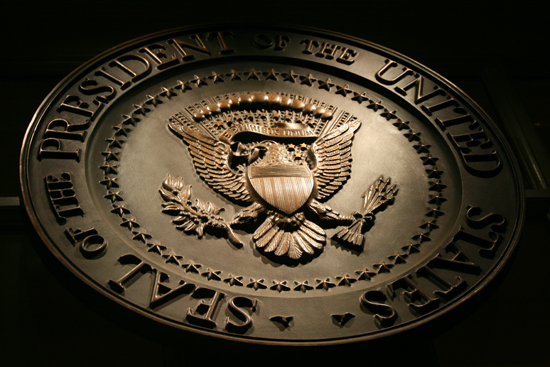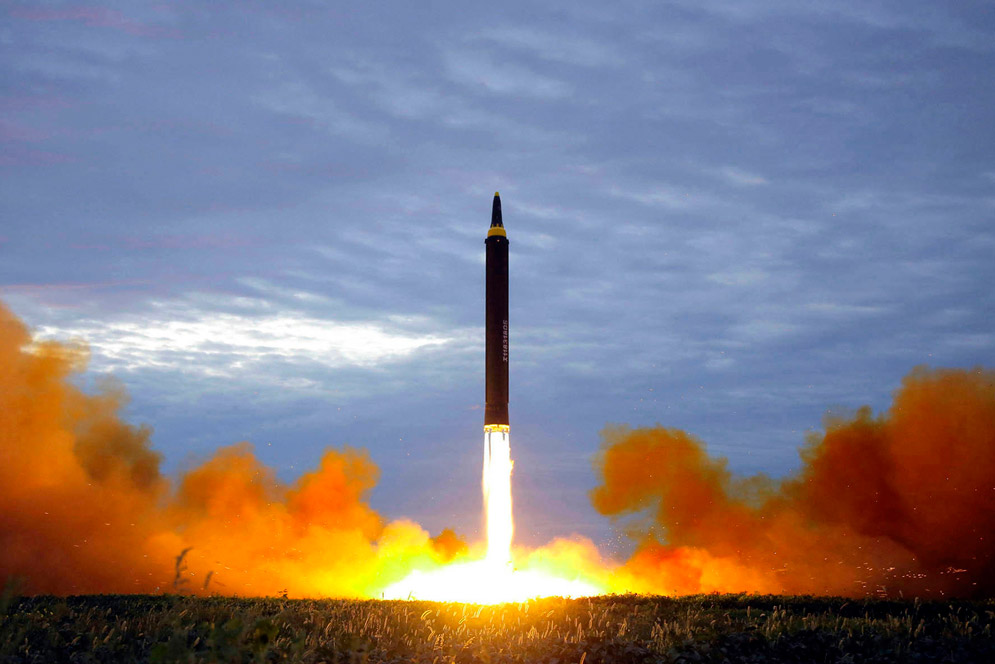One Class, One Day: Running for the Presidency
With White House race on, course examines candidates’ rhetoric

College of Arts & Sciences class Running for the Presidency studies the rhetoric necessary to win the Oval Office. Photo by Jonah Grant
Class by class, lecture by lecture, question asked by question answered, an education is built. This is one of a series of visits to one class, on one day, in search of those building blocks at BU.
“I believe in an America where the separation of church and state is absolute…[with a president] whose fulfillment of his presidential oath is not limited or conditioned by any religious oath, ritual, or obligation,” Senator John F. Kennedy declared in a famous 1960 campaign speech.
Kennedy had to soft-pedal his religion to become the nation’s first Catholic president. Barack Obama strutted his en route to becoming our first black president. The same 2008 speech condemning his former pastor’s “God damn America” rhetoric included a loving ode to Obama’s African American congregation, conjuring the biblical stories “of David and Goliath, Moses and Pharaoh, the Christians in the lion’s den, Ezekiel’s field of dry bones. Those stories—of survival and freedom and hope—became our stories, my story.” In another speech that year, Obama embraced faith-based initiatives.
One promised to keep religion out of politics; one promised to blend the two. While both genuflected to the church-state wall, each located it at different coordinates, at least rhetorically. Both got majorities of voters to trust them. What did they say to Americans about themselves and their opponents, and why did it work? That’s the question in the just-finished summer class Running for the Presidency, which will be offered again this fall, dissecting the speeches, debate utterances, and other words deployed by candidates, with special focus on the 1960, 2008, and the current campaigns.

The smattering of accents heard during a recent visit to the class tipped one off to the number of international students interested in American politics. Christos Kostoulas (ENG’14) learned from the class that American office seekers sound a lot like their counterparts in his native Greece: “I believe that politicians try to trick people in order to get what they want.” (His country came up in the discussion for a decidedly nonrhetorical bit of communication, after a neo-Nazi punched a communist member of the Greek parliament on live TV. “Is that the way they settle disputes in Greece?” instructor David Shawn asked, prompting Kostoulas’ assurance that it is not.)
The class can be an eye-opener for Americans, too. Eleanor Donahue (SMG’15), an NPR-loving political junkie and lifelong Boston-area resident, enjoyed insights on the day-and-night political environment in which Kennedy operated as well as that of today’s contenders. “Rick Santorum was also Catholic, but he was appealing to all the evangelicals, when Kennedy would never be able to win their vote,” she said. “I think that learning about the past to be able to put it in the perspective of today is really interesting.”
Shawn (GRS’98), a College of Arts & Sciences senior lecturer and Writing Center coordinator, chose the course’s three central campaigns because each featured a break from the past: the first Catholic president, the first black president, the first Mormon nominee from a major party. (And you can’t give a class this election year about running for president and not mention the 2012 contest, according to Shawn.) The class didn’t confine itself to winners. Shawn finds 2008 GOP vice presidential candidate Sarah Palin “a really remarkable character,” whose rhetoric “resonates with lots of people, but it rubs other people the wrong way.”
Besides Kennedy’s church-state speech and Obama’s on his ex-pastor, the syllabus included Obama’s keynote address to the 2004 Democratic National Convention, his debut in the national limelight; convention and concession speeches from various campaigns; debate performances; and the advertising rhetoric Obama and Mitt Romney are using this year.

Among the topics was how rhetoric gets a candidate only so far. One case study, the televised Kennedy-Nixon debates, makes the point. Famously, people who tuned in on radio thought Nixon won, but the far more numerous TV viewers gave the edge to Kennedy, whose handsome demeanor and telegenic calm contrasted in the first encounter with Nixon’s sweaty, convalescing-from-illness pallor. Shawn wants students to decide for themselves whether rhetoric or national conditions particular to each election—the state of the economy, say—determined who won.
As a rhetorician, he has his own bias. “Can you be an empty suit, can you say something in a way that is flat, dull, and be charismatic at the same time just because you look good?” he asked. “I’m not so sure. Words matter. They help us define who we are.”
The words-versus-circumstances debate is of special interest to politicians this year. Bad economic news of late had one Democratic congressman ruing that the economy’s state in May historically predicts the voting results in November. But, Shawn said, the current White House occupant values the power of rhetoric.
“There’s a tendency to say, oh, it’s just rhetoric, it’s just words,” he said. “Obama had this great response, where he says, ‘Just words? I have a dream¬’—referring to the greatest speech of the 20th century—‘just words?’
This Series
Also in
One Class, One Day
-
November 30, 2018
Breaking Bad Director Gives CAS Class the Inside Dope
-
October 31, 2018
Trump and the Press: We’ve Been Here Before
-
August 3, 2018
A Scholarly Take on Superheroes

Comments & Discussion
Boston University moderates comments to facilitate an informed, substantive, civil conversation. Abusive, profane, self-promotional, misleading, incoherent or off-topic comments will be rejected. Moderators are staffed during regular business hours (EST) and can only accept comments written in English. Statistics or facts must include a citation or a link to the citation.